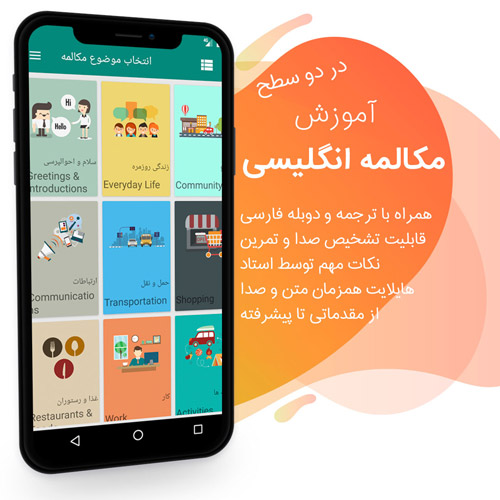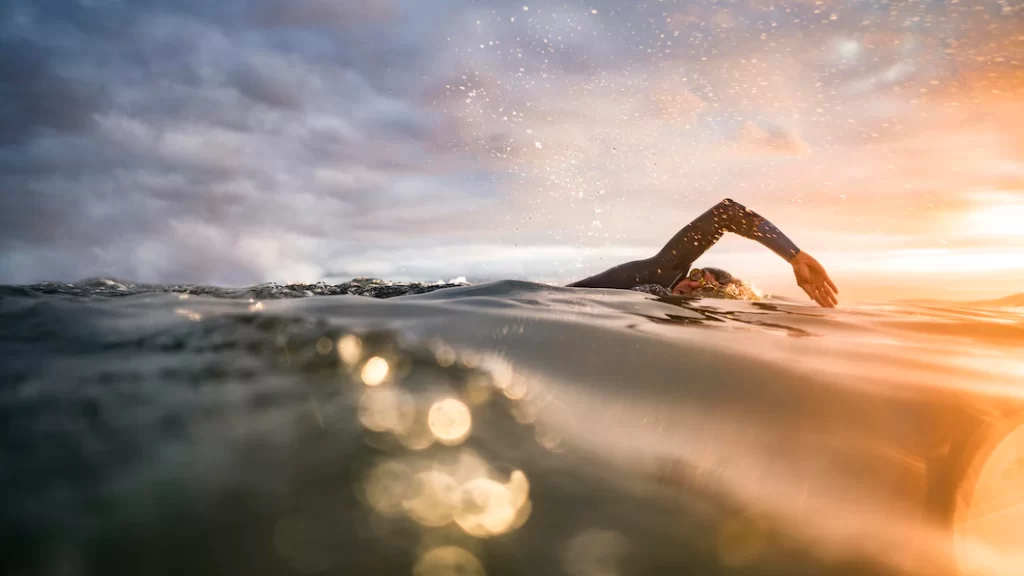یکی از بهترین تفریح ها در فصل گرما، رفتن به شنا و استخر است. شنا در سواحل آفتابی آنقدر لذت بخش است که همه ما دوست داریم سالی چند بار آن را تجربه کنیم. حتی حاضر هستیم ساعتها رانندگی کنیم تا به شهرهای ساحلی برسیم. در این مکالمه می خواهیم درباره اصطلاحات شنا به زبان انگلیسی صحبت کنیم. در این مکالمه دو شخص در هنگام قایق سواری تصمیم می گیرند کمی هم شنا کنند که با خطری غیر قابل پیش بینی، یعنی حضور یک کوسه مواجه می شوند! مکالمه انگلیسی را گوش دهید و لغات مهم آن را مرور کنید.
سپس می توانید پادکست آموزش مکالمه را کامل گوش دهید. متن بخش آموزشی را می توانید در پایین فایل صوتی ببینید. این متن در هنگام پخش هایلایت خواهد شد.
پیشنهادهای ویژه

نرم افزار آموزش مکالمه انگلیسی (ویژه اندروید)
با قابلیت تشخیص صدا و ترجمه فارسی

بسته کامل آموزش مکالمه زبان انگلیسی
شامل مجموعههای ویدویی و صوتی
🗣 Swim faster (سریعتر شنا کن)
A: This is such a beautiful day! Great day for sailing!
امروز چه روز قشنگیه! روز خیلی خوبی برای قایقرانی (کشتیرانی) است.
B: It sure is! The water looks so nice! Anchor the boat for a little while. I’m going to take a dip.
اره دقیقا همینطوره! آب خیلی قشنگه! قایق رو برای لحظه ای لنگر بنداز (نگه دار). می خوام تنی به آب بزنم.
A: Why are you doggy-paddling? I taught you how to swim! Do your breast stroke!
چرا شنای سگی میری؟ من بهت شنا کردن یاد داده ام که! شنای قورباغه ات رو برو!
B: I get too tired! I’ll just backstroke, it’s easier!
خیلی خسته می شم! من کرال پشت رو میرم، راحتتره!
A: Try kicking your legs more. That’s good. Don’t go out too far!
سعی کن پاهات رو بیشتر بزنی. خوبه. خیلی دور نرو.
B: It’s fine! Jump in!
خوبه! تو [هم] بپر!
A: Kathy! Get back here! I see a shark!
کتی! برگرد اینجا! یه کوسه می بینم!
B: Ahhhh!!!! Help me! Help! Bring the boat closer! The shark is coming straight towards me!
آه!! کمکم کن! کمک! قایق رو بیار نزدیک تر! کوسه داره مستقیم به سمت من میاد!
A: It’s right under you! Kathy!!!!!
دقیقا زیر تو اومده کتی!
🗝️ لغات انگلیسی مهم مکالمه
🔹 sail: قایقرانی، کشتیرانی
🔹 for a little while: برای یک زمان کوتاه
🔹 a dip: شنای کوتاه و سریع
▪️ Let’s take a dip in the lake.
🔹 doggy-paddle: شنای سگی
🔹 breast stroke: شنای قورباغه
🔹 backstroke: کرال پشت
🔹 straight towards: مستقیم به سمت چیزی
🔹 swim suit: (آمریکن) لباس شنا
🔹 swimming costume: (بریتیش) لباس شنا
🔹 towel: حوله
🔹 tan: برنزه کردن
🔹 dive: شیرجه
پیشنهادهای ویژه

نرم افزار آموزش مکالمه انگلیسی (ویژه اندروید)
با قابلیت تشخیص صدا و ترجمه فارسی

بسته کامل آموزش مکالمه زبان انگلیسی
شامل مجموعههای ویدویی و صوتی
🎧 پادکست صوتی آموزش انگلیسی
متن پادکست
My name is Marco. And I’m Erica. And today we’re swimming. That’s right. A nice summer time lesson for everyone. A summer time lesson. So we’re going to be talking about swimming
and well, it’s a very popular sport, right? Yeah. So this is another lesson in our sports series. Our sports series. Okay. So why don’t we preview some of the language we’ll find
in the dialogue. Vocabulary preview. Alright, we have two words to look at here. The first word is sailing. Sailing. Sailing. Sailing. Well, this is the verb to sail, right? Mm-hmm. So
sailing is traveling in a boat. In a boat with no engine. Right. So you must use the wind to push you forward. Exactly. That’s a sailboat. Yes. Okay. So sailing. Mm-hmm. Now let’s take a look
at our other word. Anchor. Another boat word here. Anchor. Anchor. Anchor. Now, it’s spelled A-N-C-H-O-R. Right. But you don’t pronounce the C-H as you normally would, right? Another one of
these really difficult to spell English words. Right. So you don’t say anchor. You would say anchor. Anchor. Anchor. Anchor. Anchor. So the anchor is a verb and a noun. That’s right. Well,
when anchor is used as a noun, it means the hook that you throw over the boat into the water, and it keeps you staying in the same place. Okay. But the verb to anchor. Yes. What does it mean?
To do that. To do that, right? So you, so to throw the anchor into the water, you would just say to anchor the boat. Exactly. To keep it in the same place. Okay. Great words related to sailing,
but now let’s listen to our dialogue for the first time. What’s what’s happening here, Erica?
Well, we’ve got two friends here who are sailing in their boat and they decide to take a swim.
Let’s see what happens.
This is such a beautiful day. Great day for sailing. It sure is. The water looks so nice.
Anchor the boat for a little while. I’m going to take a dip.
Why are you doggie paddling? I thought you had a swim. Do your breaststroke.
I get too tired. I’ll just backstroke. It’s easier.
Try kicking your legs more. That’s good. Don’t go out too far. It’s fine. Jump in.
Kathy, get back here. I see a shark. Help me. Help. Bring the boat closer.
The shark is coming straight towards me. It’s right under you. Kathy.
All right. So a shark attack. I know. This is my worst fear when swimming. Really in the ocean, right? Yeah. Well, also in the lake, but no sharks in lakes. I know, but I’m still afraid of them.
All right. So don’t worry about it. I’m sure the girl is okay. It’s probably not a shark.
Maybe it was a dolphin. Yeah. Or maybe she’s going to punch the shark in the face and she’ll escape. Okay. Let’s take a look at some of the words that we saw in language takeaway.
Language takeaway. We have three excellent swimming words for you. The first one is doggie paddling. Doggie paddling. Doggie paddling. So doggie paddling. It’s not really a proper way of swimming, right? No. You don’t see this in the Olympics. So if you’ve ever seen a dog swim,
that’s why they call it doggie paddling. Right. You’re sort of moving your hands quickly in front of you. And your legs are all over the place. Yeah. And you’re basically not really swimming.
You’re just trying to stay afloat. You’re trying not to drown. Trying not to sink. Yeah. Yep.
Okay. So doggie paddling. Again, this can be a noun or a verb. The doggie paddle, the swimming style or doggie paddling the verb. Okay. Interesting. All right. Let’s take a look
at our second swimming style. Breast stroke. Breast stroke. Breast stroke. The breast stroke.
How is this one? Well, it’s sort of like swimming like a frog. So you have your legs that are similar to like a frog, right? Yeah. And what are your hands doing? Your hands are moving
in front of you together, then out towards the side. Okay. So you’re kind of doing like circles.
Yeah. Half circles. Half circles. Okay. Breast stroke. Yeah. But you get kind of tired when you swim like this, right? Yeah, maybe. Yeah. Yeah. Now let’s take a look at our third word.
Backstroke. Backstroke. Backstroke. Backstroke. So this one’s pretty easy. Backstroke, you are lying on your back. You’re lying on your back in the water. And you’re in your feet as well.
Yep. But what are your hands doing? They’re going back behind you. See, I’m doing it now.
All right. If you guys could be here in the studio, you would see Erica doing her backstroke.
Yeah. I’m pretty good at it. Yeah. Okay. So let’s listen to this dialogue again, and then we’ll come back and look at some great phrases.
This is such a beautiful day. Great day for sailing. It sure is. The water looks so nice.
Anchor the boat for a little while. I’m going to take a dip.
Why are you doggie paddling? I taught you how to swim. Do your breaststroke.
I get too tired. I’ll just backstroke. It’s easier. Try kicking your legs more.
That’s good. Don’t go out too far. It’s fine. Jump in. Kathy, get back here. I see a shark.
Help me. Help. Bring the boat closer. The shark is coming straight towards me.
It’s right under you. Kathy.
Okay. So we have some really good phrases related to swimming and water. Yeah. Okay.
Let’s take a look at these in Fluency Builder. Fluency Builder. All right. The first one. I love this phrase. Take a dip. Take a dip. Take a dip. So if I say I’m going to take a dip,
you’re going to have a quick swim. A quick swim. Yep. So you can take a dip in the pool. Yep.
In the lake. In the ocean. In the ocean. Even in your bathtub, right? No. No. It’s just for swimming. Unless your bathtub is really, really, really big. All right. So not for the bathtub,
but for swimming. Yep. Okay. Now let’s take a look at our second phrase. For a little while.
For a little while. For a little while. For a little while.
Wow. This is really common. I use this a lot. Yeah, me too. I probably use it 500 times a day.
Okay. So let’s listen to some examples with for a little while and then we’ll come back and explain it. Example one. I’m tired. I’m just going to sit down for a little while. Example two.
It will only hurt for a little while. Example three. Do you want to play tennis for a little while?
So it means for a short time. For a short time. And you can change it, right? You can say, oh, I’m going to play for a little while. Yeah. Or I’m going to sleep for a little while.
For a short time. Yep. All right. So if learners use this phrase, I find it sounds really, really great because it’s not something that students normally use. Yeah. I guess a student
wouldn’t really use this phrase normally. Yeah. So guys, use it because you’ll sound awesome.
Yeah. You’ll sound really, really fluent. Okay. And let’s take a look at our last phrase.
Straight towards. Straight towards. Straight towards me. Straight towards.
Okay. So straight means directly. Right. In a line. In a line. Not going anywhere else, but directly. Not moving side to side. And towards is in that direction. So the shark
was coming straight towards me. It’s coming directly at me. Moving in a line and not moving side to side. Okay. So can you give me another example of how you would use straight towards?
Watch out. There’s a car coming straight towards you. Okay. Directly towards you. Yeah. Or maybe when I get home from work, I go straight towards the fridge. Really? Yes. I believe this. All
right. So straight towards directly. Okay. So we’ve looked at a lot of great words, really good phrases. Let’s listen to this dialogue one last time and then we’ll come back. And Eric
is going to tell us a really great story about boat. This is such a beautiful day. Great day for sailing. It sure is. The water looks so nice. Anchored the boat for a little while. I’m going
to take a dip. Why are you doggie paddling? I thought you had a swim. Do your breaststroke.
I get too tired. I’ll just backstroke. It’s easier. Try kicking your legs more.
That’s good. Don’t go out too far. It’s fine. Jump in. Kathy, get back here. I see a shark.
Help me. Help. Bring the boat closer. The shark is coming straight towards me.
It’s right under you. Kathy. All right. Well, Marco, I was telling you that I used to spend every summer on the lake. And my family had a really small house on a small island. And my
cousins had another small house on another small island. Okay. So our families are really close and we used to go to one house for dinner one night and the other house to dinner the next night.
So everyone was over at my cousin’s house except for my grandfather. And so he was thinking, okay, it’s late. Maybe I better go pick up my wife and see what’s going on. So he goes into the boat.
It’s dark. Okay. There’s no light on the boat. He’s driving straight towards the island when suddenly my cousin in his boat drives directly into my grandfather.
So they crashed. They crashed. Two boats crashed in the lake. Yeah. And then my grandfather’s boat flipped over. It turned upside down. Wow. And he fell in the water. But he was okay, right?
He was okay. But you know what? He was really angry about this. And the boat? The boat stayed in the water and, you know, the engine fell down to the bottom. So we had to go the next morning to
get the boat. And we actually had to hire some scuba divers to go to the bottom of the lake to get the engine. Wow. Yeah. I imagine your grandpa was pretty angry. Yeah. He tells the story every
year. Exactly. But you know what? I’ve got a million of these crazy lake stories because my family… It always happens. Yeah. Well, we’re out of time for this lesson. But until next time, bye-bye.




